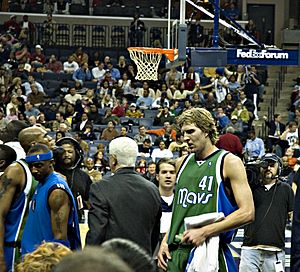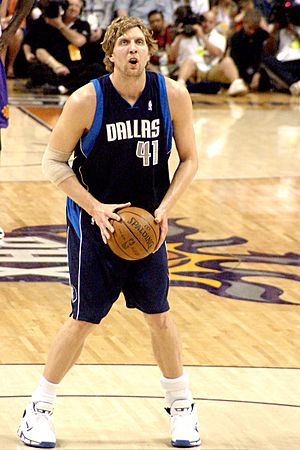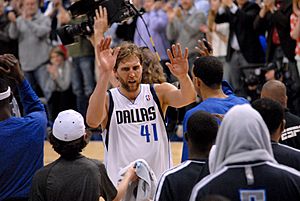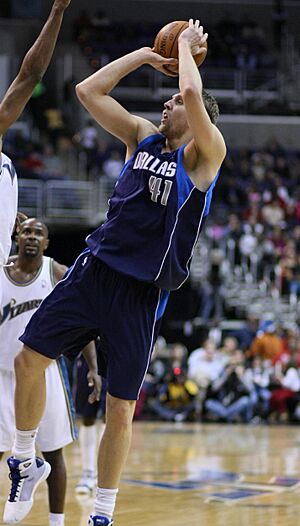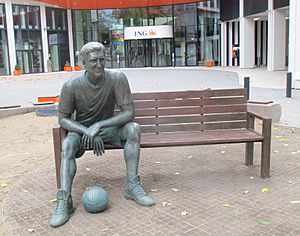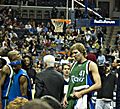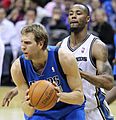Dirk Nowitzki facts for kids
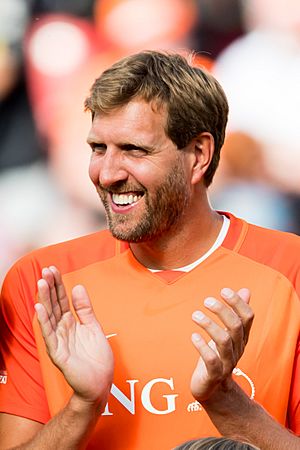
Nowitzki in 2019
|
||||||||||||||||||||
| Dallas Mavericks | ||||||||||||||||||||
|---|---|---|---|---|---|---|---|---|---|---|---|---|---|---|---|---|---|---|---|---|
| Special advisor | ||||||||||||||||||||
| Personal information | ||||||||||||||||||||
| Born | June 19, 1978 Würzburg, West Germany |
|||||||||||||||||||
| Listed height | 7 ft 0 in (2.13 m) | |||||||||||||||||||
| Listed weight | 245 lb (111 kg) | |||||||||||||||||||
| Career information | ||||||||||||||||||||
| NBA Draft | 1998 / Round: 1 / Pick: 9th overall | |||||||||||||||||||
| Selected by the Milwaukee Bucks | ||||||||||||||||||||
| Pro career | 1994–2019 | |||||||||||||||||||
| League | NBA | |||||||||||||||||||
| Career history | ||||||||||||||||||||
| 1994–1998 | DJK Würzburg | |||||||||||||||||||
| 1998–2019 | Dallas Mavericks | |||||||||||||||||||
| Career highlights and awards | ||||||||||||||||||||
|
||||||||||||||||||||
| Career NBA statistics | ||||||||||||||||||||
| Points | 31,560 (20.7 ppg) | |||||||||||||||||||
| Rebounds | 11,489 (7.5 rpg) | |||||||||||||||||||
| Assists | 3,651 (2.4 apg) | |||||||||||||||||||
|
Medals
|
||||||||||||||||||||
Dirk Werner Nowitzki (born June 19, 1978) is a German former professional basketball player. He is now a special advisor for the Dallas Mavericks in the National Basketball Association (NBA). Standing at 7 ft 0 in (2.13 m), he is known as one of the greatest power forwards ever. Many also consider him the best European player of all time. In 2021, he was chosen for the NBA 75th Anniversary Team. Nowitzki was inducted into the Naismith Memorial Basketball Hall of Fame in 2023.
Nowitzki started his career with the DJK Würzburg basketball club. He was picked ninth in the 1998 NBA draft by the Milwaukee Bucks. He was immediately traded to the Dallas Mavericks. He played his entire 21-year NBA career with the Mavericks. Nowitzki led the Mavericks to 15 NBA playoff appearances. This included their first NBA Finals in 2006 and their only NBA championship in 2011. He was famous for his scoring, shooting, and his special one-legged fadeaway jump shot. Nowitzki won the NBA Most Valuable Player Award in 2007 and the NBA Finals Most Valuable Player Award in 2011.
Dirk Nowitzki is the only player to play for one NBA team for 21 seasons. He was an All-Star 14 times. He was also named to the All-NBA Team 12 times. He was the first European player to start in an All-Star Game. He was also the first European to win the NBA Most Valuable Player Award. Nowitzki is the highest-scoring player born outside the U.S. in NBA history. He holds many all-time Mavericks team records. In 2012, he became the first non-American player to receive the Naismith Legacy Award. When he retired, Nowitzki was sixth on the NBA all-time scoring list.
In international games, Nowitzki led the Germany national team to a bronze medal in the 2002 FIBA World Championship. He also won a silver medal in EuroBasket 2005. He was the top scorer and MVP in both tournaments. His number 14 jersey was retired by the German national team in September 2022. This was a great honor for him.
Contents
- Early Life and Basketball Start
- Professional Career in Germany
- NBA Career with Dallas Mavericks
- National Team Career
- Player Profile
- NBA Career Statistics
- Career Highlights and Awards
- Personal Life
- Honors and Recognition
- Images for kids
- See also
Early Life and Basketball Start
Dirk Werner Nowitzki was born in Würzburg, Germany. His family was very athletic. His mother, Helga, was a professional basketball player. His father, Jörg-Werner, played handball for Germany. His older sister, Silke, also played basketball. She now works for the NBA.
Nowitzki was a very tall child. He was often much taller than other kids his age. He first played handball and tennis. He was a good junior tennis player in Germany. But he soon got tired of being called "freak" because of his height. He then decided to play basketball. Watching the 1992 U.S. Olympic "Dream Team" also made him love basketball.
After joining the local DJK Würzburg club, 15-year-old Dirk caught the eye of Holger Geschwindner. Geschwindner was a former German basketball player. He saw Dirk's talent right away. He offered to coach Dirk individually several times a week. Dirk's parents agreed to this special training. Geschwindner focused on shooting and passing. He did not focus much on weight training or team drills. He also encouraged Dirk to play music and read books. He wanted Dirk to be a well-rounded person.
After one year, Geschwindner was very impressed. He told Dirk he had to choose. He could either play against the best in the world or stay a local hero. Dirk thought about it for two days. He then chose to train every day to become an international player. In the summer of 1994, 16-year-old Nowitzki joined the DJK team.
Professional Career in Germany
DJK Würzburg (1994–1998)
When Nowitzki joined DJK, they played in Germany's second-tier league. His first coach, Pit Stahl, played him as an outside-scoring forward. This allowed Dirk to use his shooting skills. Nowitzki chose jersey number 14 because Charles Barkley wore it in the 1992 Olympics. In his first season (1994–95), Dirk often sat on the bench. He also struggled with school.
In the 1995–96 season, Nowitzki became a starter. He played alongside Finnish star Martti Kuisma. He soon started scoring double-digit points regularly. German national coach Dirk Bauermann saw him score 24 points in a game. He said Dirk was the greatest German basketball talent in many years.
In the 1996–97 season, Nowitzki averaged 19.4 points per game. He helped DJK finish second. But they could not get promoted to the top league. In the 1997–98 season, Nowitzki finished his high school exams. He also had to do military service. The 18-year-old, who was now 6 ft 11 in (2.11 m) tall, kept getting better. He led DJK to promotion to the top league. Nowitzki was voted "German Basketballer of the Year."
Nowitzki's talent was noticed outside Germany. He played against NBA stars like Charles Barkley and Scottie Pippen in the Nike "Hoop Heroes Tour." In a short game, Nowitzki played better than Barkley. He even dunked on him! Barkley said, "The boy is a genius. If he wants to enter the NBA, he can call me." In March 1998, Nowitzki played in the Nike Hoop Summit. This was a big event for young talents. He scored 33 points, grabbed 14 rebounds, and had 3 steals. He showed off his speed, ball handling, and shooting. Many European and NBA teams wanted him after that.
NBA Career with Dallas Mavericks
Early Years (1998–1999)
Nowitzki decided to go straight to the NBA from high school. The Milwaukee Bucks picked him ninth in the 1998 NBA draft. They immediately traded him to the Dallas Mavericks. Future star point guard Steve Nash also came to Dallas in the same trade. Nowitzki and Nash quickly became good friends. Dirk was the fourth German player in NBA history. He couldn't wear his number 14 jersey in Dallas. So, he switched the numbers and wore number 41.
The Mavericks had not made the playoffs since 1990. The start of the 1998–99 season was delayed by an NBA lockout. Nowitzki went back to DJK Würzburg and played 13 games. When the NBA season finally started, Nowitzki struggled. He played as a power forward. He felt weaker than other NBA players. He also had trouble with defense. He averaged only 8.2 points and 3.4 rebounds. Nowitzki later said he was so frustrated he thought about going back to Germany. The Mavericks won only 19 games and missed the playoffs.
The "Big Three" Era (1999–2004)
Becoming a Star (1999–2000)
In January 2000, Mark Cuban bought the Mavericks. Cuban invested a lot in the team. He bought them a private jet and increased team income. Nowitzki praised Cuban, saying he created a "perfect environment." With help from coach Don Nelson and Cuban's support, Nowitzki improved a lot in his second season. He averaged 17.5 points, 6.5 rebounds, and 2.5 assists. He was second for the NBA Most Improved Player Award. He also played in the NBA All-Star Sophomore squad. Nowitzki was chosen for the Three-Point Contest. He was the tallest player ever to join it. The Mavericks missed the playoffs again with a 40–42 record.
First Playoff Appearances (2000–2002)
In the 2000–01 season, Nowitzki got even better. He averaged 21.8 points, 9.2 rebounds, and 2.1 assists. He played and started all 82 games. He became the first Maverick to be chosen for an All-NBA team. His friend Nash became a great point guard. With Michael Finley also scoring a lot, they were called the "Big Three."
The Mavericks had a 53–29 record and made the playoffs for the first time since 1990. They beat the Utah Jazz in five games. Then they faced the San Antonio Spurs. Nowitzki got sick with the flu and lost a tooth. He scored 42 points and grabbed 18 rebounds in Game 5. But the Mavericks lost the series.
Before the 2001–02 season, Nowitzki signed a big contract. He averaged 23.4 points, 9.9 rebounds, and 2.4 assists. He was voted into the All-NBA Second Team and his first All-Star Game. The Mavericks swept the Minnesota Timberwolves in the first round. Nowitzki averaged 33.3 points per game. In the second round, they played the Sacramento Kings. The Kings' coach changed his defense to stop Nowitzki. Dirk struggled and the Mavericks lost the series. But Nowitzki was voted "European Basketballer of the Year."
Reaching the Western Conference Finals (2002–2003)
Before the 2002–03 season, the Mavericks focused more on defense. They won their first 14 games. Nowitzki averaged 25.1 points, 9.9 rebounds, and 3.0 assists. He led the Mavericks to a team-record 60 wins. They were the third seed in the playoffs. They beat the Portland Trail Blazers in seven games. Nowitzki said his clutch three-pointer in Game 7 was the most important basket of his career.
In the next round, they beat the Kings in seven games. Nowitzki had 30 points and 19 rebounds in Game 7. In the Western Conference Finals, they played the Spurs again. In Game 3, Nowitzki hurt his knee and had to leave the series. Without him, the Mavericks lost in six games.
Playoff Disappointment (2003–2004)
Dallas traded their starting center. Coach Don Nelson decided to start Nowitzki at center. Dirk gained 20 lb (9.1 kg) of muscle to handle the more physical role. His scoring averages dropped to 21.8 points, 8.7 rebounds, and 2.7 assists. But he still led the team in scoring, rebounding, steals, and blocks. He was an All-Star again. The Mavericks lost to the Sacramento Kings in five games in the playoffs.
Franchise Player (2004–2010)
First All-NBA First Team (2004–2005)
Before the 2004–05 season, Steve Nash left Dallas to join the Phoenix Suns. Nash went on to win two MVP awards. During the season, coach Don Nelson resigned. His assistant, Avery Johnson, became the new head coach. Nowitzki stepped up his game. He averaged a career-high 26.1 points and 9.7 rebounds. He also had career highs in blocks and assists. In December 2004, Nowitzki scored a career-best 53 points against the Houston Rockets. He was voted to the All-NBA First Team for the first time. He also finished third in the league's MVP voting.
In the playoffs, the Mavericks beat the Houston Rockets in seven games. Then they met the Phoenix Suns, Nash's new team. The Suns won the series in six games. Nowitzki struggled with his shooting in the final game.
First NBA Finals Appearance (2005–2006)
Before the 2005–06 season, Michael Finley left the Mavericks. Nowitzki was the last player left from the "Big Three." He averaged 26.6 points, 9.0 rebounds, and 2.8 assists. This was his third season with over 2,000 points. His scoring average was the highest ever by a European player. He also improved his shooting percentages. During the 2006 All-Star Weekend, Nowitzki won the Three-Point Contest.
Nowitzki led Dallas to 60 wins. He finished third in MVP voting again. He was also elected to the All-NBA First Team. In the playoffs, Nowitzki averaged 27.0 points and 11.7 rebounds. The Mavericks swept the Memphis Grizzlies. In the next round, they played the San Antonio Spurs again. The series went to Game 7. Nowitzki made a clutch three-point play to tie the game. The Mavericks won and advanced to the Western Conference Finals. They beat the Suns in six games. Nowitzki scored a playoff career high 50 points in Game 5. The Mavericks reached the 2006 NBA Finals to face the Miami Heat.
The Mavericks took an early 2–0 lead in the Finals. But they lost a big lead in Game 3. Nowitzki struggled with his shooting in the last three games. The Mavericks lost the series, 4–2, to the Heat. Dirk said the Game 3 loss really changed the series.
NBA MVP Season (2006–2007)
In the 2006–07 season, Nowitzki shot a career-best 50.2% from the field. He averaged 24.6 points, 8.9 rebounds, and 3.4 assists. He led the Mavericks to a team-record 67 wins. They were the top seed in the Western Conference. He became one of only five players in NBA history to join the 50–40–90 club. This means he shot 50% from the field, 40% from three-point range, and 90% from the free-throw line.
Nowitzki was expected to lead the Mavericks to an easy win against the eighth-seed Golden State Warriors. But the Mavericks lost to the Warriors in six games. This was the first time a No. 8 seed beat a No. 1 seed in a best-of-seven series. Nowitzki struggled in Game 6, scoring only eight points. He called this loss a low point in his career. Despite the loss, Nowitzki was named the NBA's Most Valuable Player. He was the first European player to win this award.
More Playoff Challenges (2007–2010)
The 2007–08 season saw another first-round playoff exit. The Mavericks traded for Jason Kidd. Nowitzki averaged 23.6 points, 8.6 rebounds, and a career-high 3.5 assists. They lost to the New Orleans Hornets in five games. This led to coach Avery Johnson being replaced by Rick Carlisle. Nowitzki had his first career triple-double in February 2008. He also became the Mavericks' all-time leading scorer in March 2008.
In the 2008–09 season, Nowitzki averaged 25.9 points, 8.4 rebounds, and 2.4 assists. He was fourth in the league in scoring. He was selected for his eighth All-Star game. Dallas finished 50–32 and beat the San Antonio Spurs in the first round. But they lost to the Denver Nuggets in the second round.
The Mavericks finished as the second seed in the 2009–10 season. They added Shawn Marion and Caron Butler. In January 2010, Nowitzki became the 34th player in NBA history to reach 20,000 points. He was the first European to do so. He was selected for his ninth All-Star Game. The Mavericks lost to San Antonio again in the first round. After the season, Nowitzki signed a new four-year contract to stay in Dallas.
Championship Season (2010–2011)
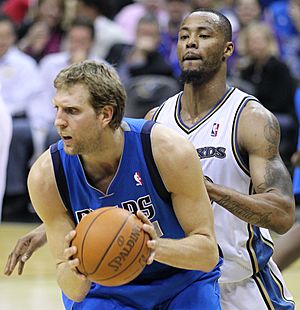
Before the 2010–11 season, the Mavericks traded for center Tyson Chandler. Nowitzki was injured during the season but still averaged 23 points, 7 rebounds, and 3 assists. He was selected for his tenth All-Star Game. The Mavericks beat Portland in the first round of the playoffs. Then they swept the two-time defending champion Lakers.
In the Conference Finals, they faced the Oklahoma City Thunder. In Game 1, Nowitzki scored 48 points. He set an NBA record by making 24 free throws in a row in one game. In Game 4, Nowitzki scored 40 points. He led his team back from a 15-point deficit in the fourth quarter to win in overtime. Dallas won the Western Conference title in Game Five.
In the 2011 NBA Finals, Dallas played the Miami Heat again. The Heat had added All-Stars LeBron James and Chris Bosh. In Game 1, Nowitzki tore a tendon in his left middle finger. But he said it would not stop him. In Game 2, he led Dallas back from a 15-point deficit in the fourth quarter. He made a left-handed layup to tie the series. Miami took a 2–1 lead. In Game 4, Nowitzki played with a 101°F fever. He made the winning basket to tie the series again. This reminded people of Michael Jordan's "Flu Game." Dallas won the next two games. Nowitzki scored 10 points in the fourth quarter of the final game. The championship was the first in the team's history. Nowitzki was named NBA Finals Most Valuable Player.
Later Career (2011–2019)
Post-Championship Years (2011–2013)
After the championship, the NBA had a lockout. The Mavericks lost key players like Tyson Chandler. Nowitzki made his 11th straight All-Star game appearance. The Mavericks were swept by the Oklahoma City Thunder in the 2012 playoffs.
Before the 2012–13 season, Nowitzki had knee surgery. He missed the first 27 games. He returned in December 2012. In January 2013, Nowitzki and his teammates made a pact. They would not shave their beards until the team reached a .500 winning record. They were called "The Beard Bros." In April 2013, Nowitzki scored his 25,000th point. He became the 17th player in NBA history to do so. The Mavericks reached a 40–40 record, and Nowitzki shaved his beard. But the Mavericks missed the playoffs for the first time in 12 years.
Milestones and Final Playoff Appearance (2013–2016)
On January 29, 2014, Nowitzki scored his 26,000th point. In March 2014, he passed John Havlicek on the NBA scoring list. In April 2014, he passed Oscar Robertson to move to 10th all-time. Nowitzki led the Mavericks back to the playoffs. They lost to the San Antonio Spurs in seven games.
In July 2014, Nowitzki re-signed with the Mavericks. He was reunited with Tyson Chandler. In November 2014, Nowitzki passed Hakeem Olajuwon as the highest-scoring player born outside the United States. Six days later, he became the fourth player to score 27,000 points with the same team. In December, he passed Elvin Hayes for eighth place. In January 2015, he passed Moses Malone for seventh place. He recorded his 10,000th career rebound in March. He scored his 28,000th career point in April. The Mavericks lost to the Houston Rockets in five games in the 2015 playoffs.
In November 2015, Nowitzki scored a season-high 31 points. He also passed Shawn Marion for 15th on the all-time rebounding list. In December, Nowitzki moved past Shaquille O'Neal into sixth place on the NBA's career scoring list. In February 2016, he became the sixth player to reach 29,000 career points. In March, he scored 40 points, his first 40-point game since 2014. In the 2016 playoffs, Nowitzki passed Elgin Baylor for 15th on the NBA's career playoff scoring list. The Mavericks lost the series to the Oklahoma City Thunder.
30,000 Points and Retirement (2016–2019)
On July 27, 2016, Nowitzki re-signed with the Mavericks. He missed games early in the season due to Achilles tendon problems. On March 7, 2017, Nowitzki became the sixth player in NBA history to score 30,000 regular-season points. He was the first international player to reach this milestone. He was also one of only three players to score all 30,000-plus points with one team. The Mavericks missed the playoffs that season.
Nowitzki re-signed with the Mavericks for two more years in July 2017. In February 2018, he became the sixth player to reach 50,000 career minutes played. Later that month, he reached 31,000 career points. In March, he played in his 1,463rd game, moving past Kevin Garnett into fifth place all-time. He had ankle surgery in April and missed the rest of the season. The Mavericks missed the playoffs again.
On July 23, 2018, Nowitzki re-signed for his final season. On December 13, 2018, he set an NBA record. He played 21 seasons with the same team, breaking Kobe Bryant's record. He also became the fifth player to play 21 seasons in total. Nowitzki was named to his 14th All-Star game. On March 18, 2019, Nowitzki became the sixth-highest scoring player of all time. He passed Wilt Chamberlain's 31,419 points.
In his final home game on April 9, Nowitzki scored 30 points. He announced his retirement in an emotional ceremony. Many NBA legends like Charles Barkley and Scottie Pippen were there to honor him. One day later, he played his last NBA game. He had 20 points and 10 rebounds in a loss to the Spurs.
National Team Career
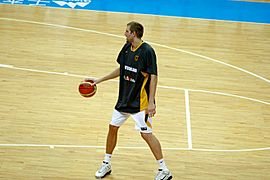
Nowitzki started playing for the German national basketball team in 1997. In his first tournament, EuroBasket 1999, he was Germany's main scorer. But Germany finished seventh and did not qualify for the 2000 Olympic Games. In EuroBasket 2001, Nowitzki was the top scorer. Germany reached the semi-finals but lost to Turkey in overtime. They then lost to Spain and did not win a medal. However, Nowitzki led the tournament in points and rebounds. He was voted to the All-Star team.
Nowitzki won his first medal leading Germany to a bronze in the 2002 FIBA World Championship. In the quarter-finals, he scored 10 points in the last quarter to beat Spain. In the semi-finals, they lost to Argentina. But Germany won 117–94 against New Zealand for the bronze medal. Nowitzki was the tournament's top scorer and was named MVP.
In EuroBasket 2005, Nowitzki led a German team to the Finals. They beat Slovenia and Spain. Against Spain, Nowitzki scored the winning basket with 3.9 seconds left. Despite losing the Finals to Greece, Nowitzki was the tournament's leading scorer and MVP. He received a standing ovation from the crowd. He called it "one of the best moments of [his] career." The German team won a silver medal.
Nowitzki led Germany to a fifth-place finish in EuroBasket 2007. He was the leading scorer. This finish allowed Germany to play in a qualifying tournament for the 2008 Olympics. Nowitzki scored 32 points in the decisive game against Puerto Rico. This win sent the German basketball team to their first Olympics since 1992. Nowitzki was chosen to be the flag bearer for Germany at the 2008 Olympics Opening Ceremony. Germany finished tenth in the Olympics.
Nowitzki skipped some international tournaments later in his career. In 2015, he captained Germany at EuroBasket 2015. They were eliminated in the group stage. In January 2016, Nowitzki officially retired from Germany's national team. He averaged 19.7 points, 7.5 rebounds, and 1.6 assists in his national team career.
Nowitzki won many awards for his play in Europe. He was named the Euroscar European Basketball Player of the Year five years in a row. He also won the FIBA Europe Men's Player of the Year twice. In September 2022, the German Basketball Federation retired his number 14 jersey. This ceremony happened before Germany's EuroBasket opening game.
Player Profile
Nowitzki was a very versatile player. He mostly played power forward. But he also played center and small forward. He was an amazing shooter for his height. He made 88% of his free throws, almost 50% of his field goals, and almost 40% of his three-point shots. He won the 2006 NBA All-Star Three-Point Contest. In the 2006–07 season, he joined the 50–40–90 club. This means he shot 50% from the field, 40% from three-point range, and 90% from the free-throw line in one season.
Nowitzki's shooting was hard to stop because of his height and unique shooting style. His release point was high above his head. Before the 2011 NBA Finals, LeBron James called Nowitzki's one-legged fadeaway the second most unstoppable move ever. Only Kareem Abdul-Jabbar's skyhook was better.
Nowitzki could also drive to the basket like smaller players. NBA.com praised his versatility. They said he could grab a rebound and lead a fast break or shoot a three-pointer. Charles Barkley joked that the best way to guard Nowitzki was to "get a cigarette and a blindfold." Later in his career, Nowitzki also developed a unique post-up game. He would back down defenders from the free-throw line. In 2022, The Athletic ranked Nowitzki as the 21st greatest player in NBA history.
Nowitzki was the sixth player in NBA history to score 30,000 points. He was the first European to do so. He is the Dallas Mavericks' all-time leader in points, rebounds, blocks, and many other stats. He was an NBA All-Star 14 times. He was named to the All-NBA Team 12 times. He won the NBA MVP in 2007 and the MVP of the 2011 NBA Finals. He also won the 2006 Three-Point Contest. He was named European Basketballer of the Year five times. He was the leading scorer and MVP of the 2002 FIBA World Championship and EuroBasket 2005 tournaments.
Nowitzki is the only player to have at least 30,000 points, 10,000 rebounds, 3,000 assists, 1,200 steals, 1,250 blocks, and 1,500 three-point field goals.
NBA Career Statistics
| Legend | |||||
|---|---|---|---|---|---|
| GP | Games played | GS | Games started | MPG | Minutes per game |
| FG% | Field goal percentage | 3P% | 3-point field goal percentage | FT% | Free throw percentage |
| RPG | Rebounds per game | APG | Assists per game | SPG | Steals per game |
| BPG | Blocks per game | PPG | Points per game | Bold | Career high |
Regular season
| Year | Team | GP | GS | MPG | FG% | 3P% | FT% | RPG | APG | SPG | BPG | PPG |
|---|---|---|---|---|---|---|---|---|---|---|---|---|
| 1998–99 | Dallas | 47 | 24 | 20.4 | .405 | .206 | .773 | 3.4 | 1.0 | .6 | .6 | 8.2 |
| 1999–00 | Dallas | 82 | 81 | 35.8 | .461 | .379 | .830 | 6.5 | 2.5 | .8 | .8 | 17.5 |
| 2000–01 | Dallas | 82 | 82* | 38.1 | .474 | .387 | .838 | 9.2 | 2.1 | 1.0 | 1.2 | 21.8 |
| 2001–02 | Dallas | 76 | 76 | 38.0 | .477 | .397 | .853 | 9.9 | 2.4 | 1.1 | 1.0 | 23.4 |
| 2002–03 | Dallas | 80 | 80 | 39.0 | .463 | .379 | .881 | 9.9 | 3.0 | 1.4 | 1.0 | 25.1 |
| 2003–04 | Dallas | 77 | 77 | 37.9 | .462 | .341 | .877 | 8.7 | 2.7 | 1.2 | 1.4 | 21.8 |
| 2004–05 | Dallas | 78 | 78 | 38.7 | .459 | .399 | .869 | 9.7 | 3.1 | 1.2 | 1.5 | 26.1 |
| 2005–06 | Dallas | 81 | 81 | 38.1 | .480 | .406 | .901 | 9.0 | 2.8 | .7 | 1.0 | 26.6 |
| 2006–07 | Dallas | 78 | 78 | 36.2 | .502 | .416 | .904 | 8.9 | 3.4 | .7 | .8 | 24.6 |
| 2007–08 | Dallas | 77 | 77 | 36.0 | .479 | .359 | .879 | 8.6 | 3.5 | .7 | .9 | 23.6 |
| 2008–09 | Dallas | 81 | 81 | 37.7 | .479 | .359 | .890 | 8.4 | 2.4 | .8 | .8 | 25.9 |
| 2009–10 | Dallas | 81 | 80 | 37.5 | .481 | .421 | .915 | 7.7 | 2.7 | .9 | 1.0 | 25.0 |
| 2010–11† | Dallas | 73 | 73 | 34.3 | .517 | .393 | .892 | 7.0 | 2.6 | .5 | .6 | 23.0 |
| 2011–12 | Dallas | 62 | 62 | 33.5 | .457 | .368 | .896 | 6.8 | 2.2 | .7 | .5 | 21.6 |
| 2012–13 | Dallas | 53 | 47 | 31.3 | .471 | .414 | .860 | 6.8 | 2.5 | .7 | .7 | 17.3 |
| 2013–14 | Dallas | 80 | 80 | 32.9 | .497 | .398 | .899 | 6.2 | 2.7 | .9 | .6 | 21.7 |
| 2014–15 | Dallas | 77 | 77 | 29.6 | .459 | .380 | .882 | 5.9 | 1.9 | .5 | .4 | 17.3 |
| 2015–16 | Dallas | 75 | 75 | 31.5 | .448 | .368 | .893 | 6.5 | 1.8 | .7 | .7 | 18.3 |
| 2016–17 | Dallas | 54 | 54 | 26.4 | .437 | .378 | .875 | 6.5 | 1.5 | .6 | .7 | 14.2 |
| 2017–18 | Dallas | 77 | 77 | 24.7 | .456 | .409 | .898 | 5.7 | 1.6 | .6 | .6 | 12.0 |
| 2018–19 | Dallas | 51 | 20 | 15.6 | .359 | .312 | .780 | 3.1 | .7 | .2 | .4 | 7.3 |
| Career | 1,522 | 1,460 | 33.8 | .471 | .380 | .879 | 7.5 | 2.4 | .8 | .8 | 20.7 | |
| All-Star | 14 | 2 | 16.2 | .450 | .290 | .875 | 3.7 | 1.1 | .7 | .4 | 8.7 | |
Playoffs
| Year | Team | GP | GS | MPG | FG% | 3P% | FT% | RPG | APG | SPG | BPG | PPG |
|---|---|---|---|---|---|---|---|---|---|---|---|---|
| 2001 | Dallas | 10 | 10 | 39.9 | .423 | .283 | .883 | 8.1 | 1.4 | 1.1 | .8 | 23.4 |
| 2002 | Dallas | 8 | 8 | 44.6 | .445 | .571 | .878 | 13.1 | 2.3 | 2.0 | .8 | 28.4 |
| 2003 | Dallas | 17 | 17 | 42.5 | .479 | .443 | .912 | 11.5 | 2.2 | 1.2 | .9 | 25.3 |
| 2004 | Dallas | 5 | 5 | 42.4 | .450 | .467 | .857 | 11.8 | 1.4 | 1.4 | 2.6 | 26.6 |
| 2005 | Dallas | 13 | 13 | 42.4 | .402 | .333 | .829 | 10.1 | 3.3 | 1.4 | 1.6 | 23.7 |
| 2006 | Dallas | 23 | 23 | 42.7 | .468 | .343 | .895 | 11.7 | 2.9 | 1.1 | .6 | 27.0 |
| 2007 | Dallas | 6 | 6 | 39.8 | .383 | .211 | .840 | 11.3 | 2.3 | 1.8 | 1.3 | 19.7 |
| 2008 | Dallas | 5 | 5 | 42.2 | .473 | .333 | .808 | 12.0 | 4.0 | .2 | 1.4 | 26.8 |
| 2009 | Dallas | 10 | 10 | 39.5 | .518 | .286 | .925 | 10.1 | 3.1 | .9 | .8 | 26.8 |
| 2010 | Dallas | 6 | 6 | 38.8 | .547 | .571 | .952 | 8.2 | 3.0 | .8 | .7 | 26.7 |
| 2011† | Dallas | 21 | 21 | 39.3 | .485 | .460 | .941 | 8.1 | 2.5 | .6 | .6 | 27.7 |
| 2012 | Dallas | 4 | 4 | 38.5 | .442 | .167 | .905 | 6.3 | 1.8 | .8 | .0 | 26.8 |
| 2014 | Dallas | 7 | 7 | 37.6 | .429 | .083 | .806 | 8.0 | 1.6 | .9 | .9 | 19.1 |
| 2015 | Dallas | 5 | 5 | 36.2 | .452 | .235 | .929 | 10.2 | 2.4 | .4 | .4 | 21.2 |
| 2016 | Dallas | 5 | 5 | 34.0 | .494 | .364 | .941 | 5.0 | 1.6 | .4 | .6 | 20.4 |
| Career | 145 | 145 | 40.7 | .462 | .365 | .892 | 10.0 | 2.5 | 1.0 | .9 | 25.3 | |
Career Highlights and Awards
Dirk Nowitzki achieved many great things in his career:
- He won an NBA championship in 2011.
- He was named NBA Finals MVP in 2011.
- He won the NBA Most Valuable Player Award in 2007.
- He was an NBA All-Star 14 times.
- He was part of the All-NBA Team 12 times.
- He won the NBA Three-Point Contest in 2006.
- He is on the NBA 75th Anniversary Team.
- His number 41 jersey was retired by the Dallas Mavericks.
- He won a bronze medal with Germany in the 2002 FIBA World Championship.
- He won a silver medal with Germany in EuroBasket 2005.
- He was MVP in both the 2002 FIBA World Championship and EuroBasket 2005.
- He was the flag bearer for Germany at the 2008 Summer Olympics.
- He is the Dallas Mavericks' all-time leader in points, rebounds, and blocks.
- He holds the NBA record for most seasons (21) played with one team.
Personal Life
Dirk Nowitzki's sister, Silke, says he is a confident but humble person. He enjoys reading and playing the saxophone. He finished high school in Würzburg. He started the Dirk Nowitzki Foundation to help fight poverty in Africa.
Nowitzki dated Sybille Gerer, a basketball player, for 10 years. They broke up in 2002 but remained good friends. He said he wanted to start a family later in life.
In 2010, Nowitzki met Jessica Olsson. She is the sister of twin soccer players Martin and Marcus Olsson. They got married in July 2012 in Dallas. They have a daughter and two sons. Nowitzki is still a German citizen.
Nowitzki is very close to his mentor, Holger Geschwindner. He also has a strong friendship with his former teammate, Steve Nash. Nash said their friendship was strong because they were both new to Dallas and single. Nowitzki is also a big fan of association football and supports Arsenal F.C..
Honors and Recognition
On October 30, 2019, a street in Dallas was renamed Nowitzki Way. It runs past the American Airlines Center, where the Mavericks play. In December 2019, Nowitzki received the Order of Merit of the Federal Republic of Germany. This was for his work in the community.
On January 5, 2022, Nowitzki's number 41 jersey was officially retired by the Mavericks. On the same night, team owner Mark Cuban showed the design for a statue of Nowitzki. The statue was put up outside the American Airlines Center on Christmas Day 2022.
Another statue of Dirk Nowitzki was unveiled in Frankfurt, Germany, on October 12, 2023. This bronze statue shows Nowitzki sitting on a bench. It invites people to sit next to him. This statue honors his long-term advertising work with ING Germany.
Images for kids
-
Nowitzki posting up Rashard Lewis in 2011
-
Nowitzki played for the German national basketball team from 1997 to 2015.
See also
 In Spanish: Dirk Nowitzki para niños
In Spanish: Dirk Nowitzki para niños
 | Leon Lynch |
 | Milton P. Webster |
 | Ferdinand Smith |


